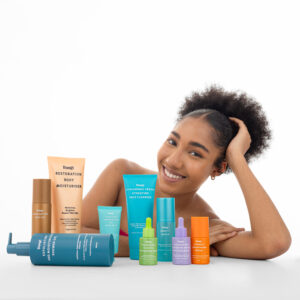
Free Shipping on Orders Over N200,0000 within Lagos
Buy 300k and get 20% off any spa service
Free Shipping For Orders over $150
Free Shipping For Orders over £100

Vitamin C is a common go-to ingredient for hyperpigmentation, especially for melanin-rich skin. Hyperpigmentation is one of the most common skin concerns among people of colour. Dark spots from acne, sun exposure, or inflammation can linger and make the skin look uneven.
Vitamin C is an effective brightening ingredient for dark/brown skin. It helps fade dark spots, protect the skin, and improve your overall skin tone.
In this post, you’ll discover how vitamin C helps treat mild hyperpigmentation and the best way to use it. As a skincare brand offering the best skincare products for melanin-rich skin concerns for 4 years +, we’ll be walking you through how to use this skincare active to achieve bright and glowing skin, like many of our valued customers.
Vitamin C is a brightening ingredient that can help fade mild hyperpigmentation, prevent new dark spots from forming, and improve overall skin tone. With consistent daily use, paired with sunscreen, you can achieve brighter and glowing skin over time.
Hyperpigmentation happens when the skin makes too much melanin, the pigment that gives skin its color. This can cause patches or spots that look darker than the surrounding skin.
The PubMed Central notes that hyperpigmentation can affect anyone. However, it is more severe in people of colour.
Vitamin C is a powerful antioxidant that protects and repairs the skin. Here’s how it helps with mild hyperpigmentation:
Vitamin C blocks an enzyme called tyrosinase, which is needed to produce melanin. By slowing melanin production, Vitamin C helps fade dark spots and prevent new ones.
Protects Against Free Radicals
Pollution, UV rays, and stress can damage skin cells and make dark spots worse. Vitamin C neutralizes free radicals and reduces oxidative stress.
Vitamin C helps the skin make collagen, a protein that keeps it firm and smooth. Collagen also helps repair areas damaged by acne and inflammation.
If you struggle with acne or irritation, Vitamin C can reduce redness and swelling while promoting healing.
Vitamin C does more than fade mild hyperpigmentation. It also:
Not all Vitamin C products are the same. Here are the recommended forms for people of color:
| Forms of Vitamin C | Strength | Best For | Stability |
| L-Ascorbic Acid | High | All skin types; Fast results | Low |
| Sodium Ascorbyl Phosphate | Medium | Acne-prone; Oily skin | High |
| Magnesium Ascorbyl Phosphate | Medium | Dry or Sensitive Skin | High |
| Ethyl Ascorbic Acid | Medium | All Skin types | Highly stable, fast-absorbing |
To get the best results, apply Vitamin C correctly:
Extra tips:
See this complete guide on how to use vitamin C serum for hyperpigmentation.
Overall, regardless of the form you choose, vitamin C is a safe and effective treatment for hyperpigmentation, especially compared to harsher treatments like hydroquinone, which can sometimes cause rebound pigmentation.
Vitamin C works well on its own, but it can also be compared to other ingredients:
Vitamin C is safe for most people. Some may notice mild tingling or dryness, especially at high strengths.
To stay safe:
If you struggle with dark spots or uneven skin tone, Vitamin C is one of the best ingredients to add to your routine. For melanin-rich skin, daily use alongside sunscreen is recommended for long-term results.
At Dang! Lifestyle, we create skincare for people of color and the Dang! Concentrated Serum [Oil Free for Oily Skin] and Q10 + Vitamin C Face Oil Serum [For Dry Skin] are some of our best sellers.
We understand the unique needs of melanin-rich skin and design formulas that work safely and effectively. Above all, consistency is key. With daily use, Vitamin C can help you achieve brighter, healthier skin.
Ready to unlock your glowing and healthy skin?
Let’s start with a skin analysis.
It helps lighten them, but ongoing use plus sunscreen is needed to prevent them from returning.
Yes, it is one of the safest brightening ingredients for darker skin tones.
No, sunscreen is always necessary, especially for preventing hyperpigmentation.
Vitamin C serum can be used from the late teens (around 18-20 years) and is beneficial at any age for preventing and treating hyperpigmentation, dullness, and early signs of aging.
It depends on the form of vitamin C used. Some, like L-ascorbic acid, are fast-acting but highly unstable, while others, like Ethyl-Ascorbic acid, are more stable, work slowly but are highly effective. Overall, it may take between 12 and 16 weeks to notice a visible difference.




